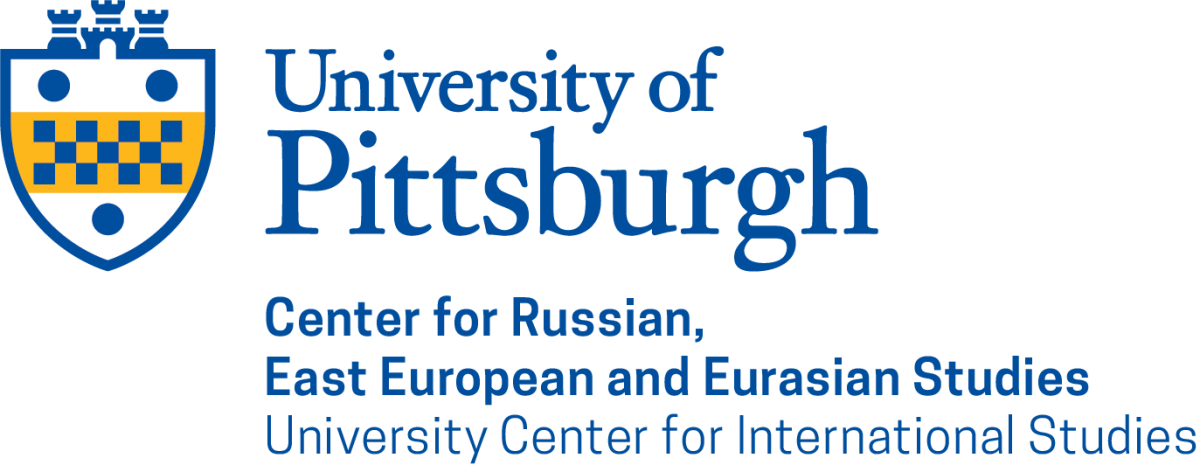From Critical Pedagogies to Research Practice and Public Engagement in Slavic, East European, and Eurasian Studies
Among the first African Americans to join the American Communist Party and an important architect of communist approaches to race, racism, and African American equality, Lovett Fort- Whiteman (1889-1939) was one of the US citizens convinced (naively, to be sure) that Soviet society showed the way for overcoming racism in the United States. While visiting the USSR in 1924, Fort-Whiteman wrote to W.E.B. Du Bois: “There is a perfect spirit of internationalism here.” “Women from the various Circassian republics and Siberia, men from China, Japan, Korea, India, etc. all live as one large family, look upon one another simply as human beings ... Here, life is poetry itself! It is the Bolshevik idea of social relations, and a miniature of the world of tomorrow.”
Communist positions on race and racism have yielded both successes and failures worldwide since 1917. Despite the mixed results, Fort-Whiteman’s words recall the impact that global colonialism has had on the social construction of identity, including in our world region; its legacy on research and teaching in Slavic, East European, and Eurasian Studies (SEEES); and its effect on perpetuating systemic inequities in academia as a whole. To address this legacy, this series is designed to elevate conversations about teaching on race and continued disparities in our field while also bringing research by scholars from underrepresented minorities and/or on communities of color to the center stage.
The series will comprise four segments: two pedagogy webinars; two lighting rounds on the experience of scholars of color in the field; and two roundtables featuring research by scholars from underrepresented minorities and/or on racial minorities, concluding with a forum on the reception of the Black Lives Matter movement in our field.
SPRING 2021 SESSIONS
FEBRUARY 5
2-3:30 pm (ET) | 1-2:30 pm (CT) | 12-1:30 pm (MT) | 11 am-12:30 pm (PT)
New Directions in Research: Russian Literature in the 19th and 20th Centuries
WATCH
MODERATOR:
 Bella Grigoryan is Associate Professor and Chair of the Department of Slavic Languages and Literatures at the University of Pittsburgh. Her recent book, Noble Subjects: The Russian Novel and the Gentry, 1762-1861 (Northern Illinois University Press, 2018) is an interdisciplinary study of how the Russian novel developed, in part, as a carrier of a masculine domestic ideology. Dr. Grigoryan’s research interests include 18th- and 19th-century Russian literature and culture, neoclassicism, sentimentalism, romanticism, realism, Russian imperial politics and aesthetics, history of the book, history of reading in the Russian Empire in a comparative context, global contexts of Russian imperial cultural production, theories and histories of the novel and new materialism.
Bella Grigoryan is Associate Professor and Chair of the Department of Slavic Languages and Literatures at the University of Pittsburgh. Her recent book, Noble Subjects: The Russian Novel and the Gentry, 1762-1861 (Northern Illinois University Press, 2018) is an interdisciplinary study of how the Russian novel developed, in part, as a carrier of a masculine domestic ideology. Dr. Grigoryan’s research interests include 18th- and 19th-century Russian literature and culture, neoclassicism, sentimentalism, romanticism, realism, Russian imperial politics and aesthetics, history of the book, history of reading in the Russian Empire in a comparative context, global contexts of Russian imperial cultural production, theories and histories of the novel and new materialism.
PRESENTATIONS:
"On How to Choose One's Ancestors: James Joyce in Russian Literature"
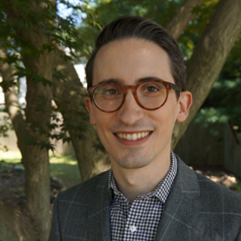 José Vergara is Visiting Assistant Professor of Russian at Swarthmore College where he teaches courses on Russian language and culture of all eras. He specializes in prose of the twentieth and twenty-first centuries, with an emphasis on experimental works. His first book, All Future Plunges to the Past: James Joyce in Russian Literature (forthcoming with Cornell University Press, 2021) examines Russian literary responses to James Joyce. He has also published articles on authors including Vladimir Nabokov, Mikhail Shishkin, and Sasha Sokolov in a variety of journals. His public writing has appeared in the Los Angeles Review of Books and Asymptote. Additionally, he has advocated for diversity and inclusivity in Slavic Studies through prison education programs. More information can be found on his website: www.josevergara.net.
José Vergara is Visiting Assistant Professor of Russian at Swarthmore College where he teaches courses on Russian language and culture of all eras. He specializes in prose of the twentieth and twenty-first centuries, with an emphasis on experimental works. His first book, All Future Plunges to the Past: James Joyce in Russian Literature (forthcoming with Cornell University Press, 2021) examines Russian literary responses to James Joyce. He has also published articles on authors including Vladimir Nabokov, Mikhail Shishkin, and Sasha Sokolov in a variety of journals. His public writing has appeared in the Los Angeles Review of Books and Asymptote. Additionally, he has advocated for diversity and inclusivity in Slavic Studies through prison education programs. More information can be found on his website: www.josevergara.net.
"Russian Symbolism and the Racial Origins of 'Tolstoy v. Dostoevsky'"
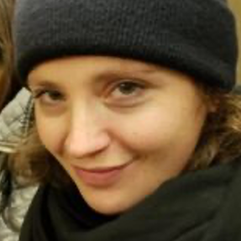 Lindsay Ceballos is Assistant Professor of Russian and East European Studies at Lafayette College. She has published articles on Pushkin, Russian symbolism, and the history of Slavic Studies in the United States. For the 2020-21 academic year, she was awarded a Postdoctoral Fellowship at the Davis Center at Harvard University and an ACLS Fellowship for work on her book manuscript, Dostoevsky's Disciples, dedicated to Dostoevsky’s afterlife in the political and religious worldviews of Symbolist, liberal, and religious-philosophical thinkers of the Silver Age.
Lindsay Ceballos is Assistant Professor of Russian and East European Studies at Lafayette College. She has published articles on Pushkin, Russian symbolism, and the history of Slavic Studies in the United States. For the 2020-21 academic year, she was awarded a Postdoctoral Fellowship at the Davis Center at Harvard University and an ACLS Fellowship for work on her book manuscript, Dostoevsky's Disciples, dedicated to Dostoevsky’s afterlife in the political and religious worldviews of Symbolist, liberal, and religious-philosophical thinkers of the Silver Age.
FEBRUARY 12
2-3:30 pm (ET) | 1-2:30 pm (CT) | 12-1:30 pm (MT) | 11 am-12:30 pm (PT)
New Directions in Research: Race, Gender, and Indigeneity in the American Arctic and Siberia
WATCH
MODERATOR:
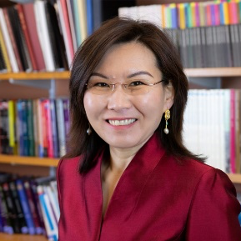 Manduhai Buyandelger is Associate Professor of Anthropology at the Massachusetts Institute of Technology. She received her Ph.D. from Harvard University and was a post-doctoral fellow at Harvard Society of Fellows. Her first book Tragic Spirits: Shamanism, Gender, and Memory in Contemporary Mongolia (University of Chicago Press, 2013) won a 2014 Francis L.K. Hsu Book Prize from the Society of East Asian Anthropology and was shortlisted as one of the top five social science books on Asia by the International Convention of Asia Scholars (ICAS) in 2015. Her essays appeared in American Ethnologist, Journal of Royal Anthropological Association, Inner Asia, and Annual Review of Anthropology. She is currently working on her second book, tentatively titled A Thousand Steps to the Parliament: Women Running for Election in Postsocialist Neoliberalizing Mongolia. In this monograph, she focuses on the ways in which democratic elections and neoliberal policies influence the co-constitution of gender and politics, and the ways in which Mongolian case makes legible some of the taken-for-granted and normalized aspects of democratization in more established democracies elsewhere.
Manduhai Buyandelger is Associate Professor of Anthropology at the Massachusetts Institute of Technology. She received her Ph.D. from Harvard University and was a post-doctoral fellow at Harvard Society of Fellows. Her first book Tragic Spirits: Shamanism, Gender, and Memory in Contemporary Mongolia (University of Chicago Press, 2013) won a 2014 Francis L.K. Hsu Book Prize from the Society of East Asian Anthropology and was shortlisted as one of the top five social science books on Asia by the International Convention of Asia Scholars (ICAS) in 2015. Her essays appeared in American Ethnologist, Journal of Royal Anthropological Association, Inner Asia, and Annual Review of Anthropology. She is currently working on her second book, tentatively titled A Thousand Steps to the Parliament: Women Running for Election in Postsocialist Neoliberalizing Mongolia. In this monograph, she focuses on the ways in which democratic elections and neoliberal policies influence the co-constitution of gender and politics, and the ways in which Mongolian case makes legible some of the taken-for-granted and normalized aspects of democratization in more established democracies elsewhere.
PRESENTATIONS:
"Gender Articulations from Decolonial Indigenous Perspectives in the Russian and American Arctic"
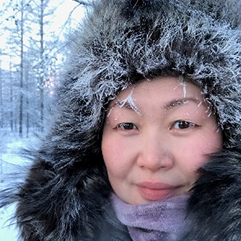 Olga Ulturgasheva is a Senior Lecturer/Associate Professor in Social Anthropology at the University of Manchester, UK. Over the last 20 years she has been engaged in several anthropological and cross-disciplinary studies exploring human and non-human personhood, childhood and youth, climate change, resilience and adaptation patterns in Siberia, Alaska, and Amazonia. She is the author of Narrating the Future in Siberia: Childhood, Adolescence and Autobiography among the Eveny (Berghahn Books 2012) and co-editor of Animism in Rainforest and Tundra: Personhood, Animals, Plants and Things in Contemporary Amazonia and Siberia (Berghahn 2012). She serves as Principal Investigator and co-Principal Investigator for two large international, collaborative research projects funded by the US National Science Foundation (NSF) and European Research Council (ERC).
Olga Ulturgasheva is a Senior Lecturer/Associate Professor in Social Anthropology at the University of Manchester, UK. Over the last 20 years she has been engaged in several anthropological and cross-disciplinary studies exploring human and non-human personhood, childhood and youth, climate change, resilience and adaptation patterns in Siberia, Alaska, and Amazonia. She is the author of Narrating the Future in Siberia: Childhood, Adolescence and Autobiography among the Eveny (Berghahn Books 2012) and co-editor of Animism in Rainforest and Tundra: Personhood, Animals, Plants and Things in Contemporary Amazonia and Siberia (Berghahn 2012). She serves as Principal Investigator and co-Principal Investigator for two large international, collaborative research projects funded by the US National Science Foundation (NSF) and European Research Council (ERC).
"Big Noses, Angry Babushki, Mixed Messages: Racialized Expectations of Linguistic and Cultural Performance in Asian Russia"
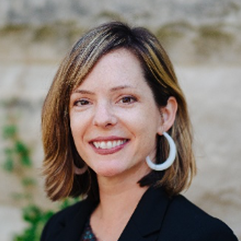 Kathryn E. Graber is Assistant Professor of Anthropology and Central Eurasian Studies at Indiana University, Bloomington. A linguistic and sociocultural anthropologist, she researches minority language politics, multilingualism, mass media, materiality, and intellectual property in Russia and Mongolia. She is the author of Mixed Messages: Mediating Native Belonging in Asian Russia (Cornell University Press, 2020) and co-editor of Storytelling as Narrative Practice: Ethnographic Approaches to the Tales We Tell (Brill, 2019). Graber’s award-winning writing on Buryatia has appeared in journals such as Slavic Review, the Journal of Linguistic Anthropology, Language & Communication, and Inner Asia, as well as in a number of Russian collections. Since 2014 she has been researching how value is negotiated in the Mongolian cashmere industry, based on fieldwork at sites along the commodity chain. Her research has been funded by agencies including the National Science Foundation, the US Department of Education/Fulbright-Hays, and the Social Science Research Council. Dr. Graber is also an award-winning teacher, offering courses at IUB that bridge anthropology and area studies. She holds an A.B. in Anthropology and Linguistics (University of Chicago), M.A. in Russian and East European Studies (University of Michigan), and M.A. and Ph.D. in Anthropology (University of Michigan). She previously held postdoctoral fellowships at the Kennan Institute of the Woodrow Wilson International Center for Scholars and at IUB.
Kathryn E. Graber is Assistant Professor of Anthropology and Central Eurasian Studies at Indiana University, Bloomington. A linguistic and sociocultural anthropologist, she researches minority language politics, multilingualism, mass media, materiality, and intellectual property in Russia and Mongolia. She is the author of Mixed Messages: Mediating Native Belonging in Asian Russia (Cornell University Press, 2020) and co-editor of Storytelling as Narrative Practice: Ethnographic Approaches to the Tales We Tell (Brill, 2019). Graber’s award-winning writing on Buryatia has appeared in journals such as Slavic Review, the Journal of Linguistic Anthropology, Language & Communication, and Inner Asia, as well as in a number of Russian collections. Since 2014 she has been researching how value is negotiated in the Mongolian cashmere industry, based on fieldwork at sites along the commodity chain. Her research has been funded by agencies including the National Science Foundation, the US Department of Education/Fulbright-Hays, and the Social Science Research Council. Dr. Graber is also an award-winning teacher, offering courses at IUB that bridge anthropology and area studies. She holds an A.B. in Anthropology and Linguistics (University of Chicago), M.A. in Russian and East European Studies (University of Michigan), and M.A. and Ph.D. in Anthropology (University of Michigan). She previously held postdoctoral fellowships at the Kennan Institute of the Woodrow Wilson International Center for Scholars and at IUB.
FEBRUARY 19
2-3:30 pm (ET) | 1-2:30 pm (CT) | 12-1:30 pm (MT) | 11 am-12:30 pm (PT)
Talking About Whiteness: Racial and Ethnic Minorities in Eastern Europe, Russia, and Central Asia
WATCH
MODERATOR:
 Roman Utkin specializes in twentieth-century Russian and Soviet poetry, prose, and visual culture. He enjoys teaching and writing on queer theory, exile, comparative modernisms, performance studies, and cinema. His current book project, Russian Berlin, examines the patterns of migration and cultural flows between Eastern and Central Europe and shows how refugees from Soviet Russia formed a unique diasporic community in Weimar Berlin. A native speaker of both Tatar and Russian, Roman serves on the board of the Committee on Advocacy for Diversity and Inclusion within the Association for Slavic, East European, and Eurasian Studies. He is also a founding member of Q*ASEEES, the Society for the Promotion of LGBTQ Studies in Eastern Europe and Central Asia. Roman was educated in Russia and the United States, earning an undergraduate degree in philology at Kazan State University (2007) and a Ph.D. in Slavic languages and literatures at Yale University (2015). Prior to joining the Wesleyan faculty, he taught at Davidson College.
Roman Utkin specializes in twentieth-century Russian and Soviet poetry, prose, and visual culture. He enjoys teaching and writing on queer theory, exile, comparative modernisms, performance studies, and cinema. His current book project, Russian Berlin, examines the patterns of migration and cultural flows between Eastern and Central Europe and shows how refugees from Soviet Russia formed a unique diasporic community in Weimar Berlin. A native speaker of both Tatar and Russian, Roman serves on the board of the Committee on Advocacy for Diversity and Inclusion within the Association for Slavic, East European, and Eurasian Studies. He is also a founding member of Q*ASEEES, the Society for the Promotion of LGBTQ Studies in Eastern Europe and Central Asia. Roman was educated in Russia and the United States, earning an undergraduate degree in philology at Kazan State University (2007) and a Ph.D. in Slavic languages and literatures at Yale University (2015). Prior to joining the Wesleyan faculty, he taught at Davidson College.
SPEAKERS:

Marius Turda is Director of the Centre for Medical Humanities and Professor in 20th Century Central and Eastern European Biomedicine at Oxford Brookes University (UK). Originally from Maramureș (northern Romania), Prof. Turda has been teaching at Oxford Brookes since 2005. He is the founding director of the Cantemir Institute at the University of Oxford (2012-2013) and founder of the Working Group on the History of Eugenics and Race (HRE), established in 2006. He is a member of Academia Europaea, Fellow of the Royal Historical Society and Fellow of the Galton Institute. He has published extensively on the history of race and eugenics in East-Central Europe, with a particular focus on Hungary and Romania. He is the general editor of the 6 volume series A Cultural History of Race (London, 2021). At the moment he's completing a book on scientific racism in interwar Hungary.
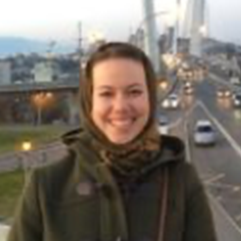 Lauren Woodard is a Postdoctoral Associate and Lecturer in Russian, East European and Eurasian Studies in the MacMillan Center at Yale University. Her research interests are migration governance, national identity, diasporas, and borders. Trained as a cultural anthropologist at the University of Massachusetts-Amherst, her research focuses on migration, race, and national identity in Russia. Based on 13 months of ethnographic fieldwork conducted among government officials and immigrants in Russia, her book project, The Politics of Return, examines tensions between exclusion and inclusion in Russia’s migration policies.
Lauren Woodard is a Postdoctoral Associate and Lecturer in Russian, East European and Eurasian Studies in the MacMillan Center at Yale University. Her research interests are migration governance, national identity, diasporas, and borders. Trained as a cultural anthropologist at the University of Massachusetts-Amherst, her research focuses on migration, race, and national identity in Russia. Based on 13 months of ethnographic fieldwork conducted among government officials and immigrants in Russia, her book project, The Politics of Return, examines tensions between exclusion and inclusion in Russia’s migration policies.
 Sean Roberts is Associate Professor of the Practice of International Affairs and Director of the International Development Studies Program at George Washington University. Having conducted ethnographic fieldwork among the Uyghur people of Central Asia and China during the 1990s, he has published extensively on this community in scholarly journals and collected volumes. In addition, he produced a documentary film on the community entitled Waiting for Uighurstan (1996). His present research is focused on China's development of the Xinjiang Uyghur Autonomous Region as well as on democracy development in former Soviet Central Asia. Roberts continues his applied work on the design and evaluation of democracy and governance projects in the former Soviet Union, most recently in Ukraine where he worked on a USAID project to support decentralization and anti-corruption.
Sean Roberts is Associate Professor of the Practice of International Affairs and Director of the International Development Studies Program at George Washington University. Having conducted ethnographic fieldwork among the Uyghur people of Central Asia and China during the 1990s, he has published extensively on this community in scholarly journals and collected volumes. In addition, he produced a documentary film on the community entitled Waiting for Uighurstan (1996). His present research is focused on China's development of the Xinjiang Uyghur Autonomous Region as well as on democracy development in former Soviet Central Asia. Roberts continues his applied work on the design and evaluation of democracy and governance projects in the former Soviet Union, most recently in Ukraine where he worked on a USAID project to support decentralization and anti-corruption.
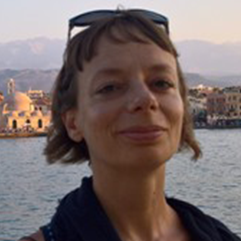 Monika Bobako is Associate Professor at the Adam Mickiewicz University in Poznań, Poland. She holds PhD as well as habilitation in philosophy and an MA in gender studies (obtained from the Central European University in Budapest). She is the author of two books, Islamophobia as a Technology of Power: A Study in Political Anthropology (Kraków 2017, in Polish) and Democracy and Difference: Multiculturalism and Feminism in the Perspective of the Politics of Recognition (Poznań 2010, in Polish). She is also the editor of the volumes The Theologies of Emancipation (Praktyka Teoretyczna, 2013) and Islamophobia: Contexts (Praktyka Teoretyczna, 2017). Her areas of specialization include political anthropology, critical race theory, postcolonial theory, and religious studies (with a special focus on Islam as well as gender). In 2018 her book Islamophobia was awarded the Jan Długosz Prize and was nominated for the Tadeusz Kotarbiński Prize, which are both major academic awards in Poland.
Monika Bobako is Associate Professor at the Adam Mickiewicz University in Poznań, Poland. She holds PhD as well as habilitation in philosophy and an MA in gender studies (obtained from the Central European University in Budapest). She is the author of two books, Islamophobia as a Technology of Power: A Study in Political Anthropology (Kraków 2017, in Polish) and Democracy and Difference: Multiculturalism and Feminism in the Perspective of the Politics of Recognition (Poznań 2010, in Polish). She is also the editor of the volumes The Theologies of Emancipation (Praktyka Teoretyczna, 2013) and Islamophobia: Contexts (Praktyka Teoretyczna, 2017). Her areas of specialization include political anthropology, critical race theory, postcolonial theory, and religious studies (with a special focus on Islam as well as gender). In 2018 her book Islamophobia was awarded the Jan Długosz Prize and was nominated for the Tadeusz Kotarbiński Prize, which are both major academic awards in Poland.
FEBRUARY 26
2-3:30pm (ET) | 1-2:30 pm (CT) | 12-1:30 pm (MT) | 11 am-12:30 pm (PT)
#BLM: Reception in Eastern Europe, Russia, and Central Asia
WATCH
MODERATOR:
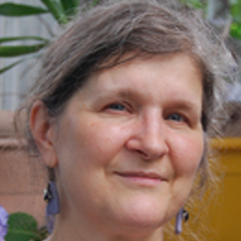 Sibelan Forrester serves as the President of the Association for Slavic, East European, and Eurasian Studies and is the Susan W. Lippincott Professor of Modern and Classical Languages and Russian at Swarthmore College in Swarthmore, Pennsylvania. Dr. Forrester’s primary academic specialty is Russian poetry of the 20th and 21st centuries, with significant secondary specializations in folklore, South Slavic literature and culture, and women’s and gender studies; she also does teaching and research in science fiction and literary translation (theory and practice). She has published numerous co-edited volumes and translations of fiction, poetry, scholarly prose and songs from Croatian, Russian and Serbian, and original poetry (in English). Her co-edited volume Times of Mobility: Transnational Literature and Gender in Translation was recently published by Central European University Press. Dr. Forrester has held fellowships from the National Endowment for the Humanities and the Social Science Research Council; her translations have won the Heldt Prize twice for Best Translation in Russian, East European and Eurasian Women’s Studies and the AATSEEL Award for Best Scholarly Translation. Dr. Forrester has served the field through numerous professional organizations, including as President of the Executive Council of the Association of Departments of Foreign Languages in the Modern Language Association) and as President of the American Association of Teachers of Slavic and East European Languages. She is the current editor of the journal Russian Studies in Literature and is on the editorial board of the Slavic and East European Journal.
Sibelan Forrester serves as the President of the Association for Slavic, East European, and Eurasian Studies and is the Susan W. Lippincott Professor of Modern and Classical Languages and Russian at Swarthmore College in Swarthmore, Pennsylvania. Dr. Forrester’s primary academic specialty is Russian poetry of the 20th and 21st centuries, with significant secondary specializations in folklore, South Slavic literature and culture, and women’s and gender studies; she also does teaching and research in science fiction and literary translation (theory and practice). She has published numerous co-edited volumes and translations of fiction, poetry, scholarly prose and songs from Croatian, Russian and Serbian, and original poetry (in English). Her co-edited volume Times of Mobility: Transnational Literature and Gender in Translation was recently published by Central European University Press. Dr. Forrester has held fellowships from the National Endowment for the Humanities and the Social Science Research Council; her translations have won the Heldt Prize twice for Best Translation in Russian, East European and Eurasian Women’s Studies and the AATSEEL Award for Best Scholarly Translation. Dr. Forrester has served the field through numerous professional organizations, including as President of the Executive Council of the Association of Departments of Foreign Languages in the Modern Language Association) and as President of the American Association of Teachers of Slavic and East European Languages. She is the current editor of the journal Russian Studies in Literature and is on the editorial board of the Slavic and East European Journal.
SPEAKERS:
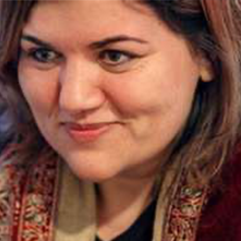 Angéla Kóczé Assistant Professor of Romani Studies, Chair of Romani Studies Program, and Academic Director of the Roma Graduate Preparation Program at Central European University, Budapest. Her research focuses on the intersections between gender, ethnicity and class as well as the social and legal inequalities faced by the Roma in various European counties. She has published several peer-reviewed academic articles and book chapters with various international presses including Palgrave Macmillan, Ashgate, and Central European University Press, as well as several thematic policy papers related to social inclusion, gender equality, social justice and civil society. She is a co-editor of The Romani Women’s Movement: Struggles and Debates in Central and Eastern Europe (Routledge, 2019), with Violetta Zentai, Jelena Jovanović and Enikő Vincze), and The Roma and their Struggle for Identity in Contemporary Europe (Oxford: Berghahn, 2020, with Huub van Baar). In 2013, the Woodrow Wilson International Center for Scholars, in Washington D.C., honored Kóczé with the Ion Ratiu Democracy Award for her interdisciplinary research approach, which combines community engagement and policy making with in-depth participatory research on the situation of the Roma. Outside of her academic career, she has worked as a Senior Policy Adviser in the Hungarian Government (2004-2008), was a director of the human rights education program at the European Roma Rights Center (1998-2003), and was the founding director of the Romaversitas program in Budapest (1996-1997), which offers scholarships and mentorship to underprivileged students.
Angéla Kóczé Assistant Professor of Romani Studies, Chair of Romani Studies Program, and Academic Director of the Roma Graduate Preparation Program at Central European University, Budapest. Her research focuses on the intersections between gender, ethnicity and class as well as the social and legal inequalities faced by the Roma in various European counties. She has published several peer-reviewed academic articles and book chapters with various international presses including Palgrave Macmillan, Ashgate, and Central European University Press, as well as several thematic policy papers related to social inclusion, gender equality, social justice and civil society. She is a co-editor of The Romani Women’s Movement: Struggles and Debates in Central and Eastern Europe (Routledge, 2019), with Violetta Zentai, Jelena Jovanović and Enikő Vincze), and The Roma and their Struggle for Identity in Contemporary Europe (Oxford: Berghahn, 2020, with Huub van Baar). In 2013, the Woodrow Wilson International Center for Scholars, in Washington D.C., honored Kóczé with the Ion Ratiu Democracy Award for her interdisciplinary research approach, which combines community engagement and policy making with in-depth participatory research on the situation of the Roma. Outside of her academic career, she has worked as a Senior Policy Adviser in the Hungarian Government (2004-2008), was a director of the human rights education program at the European Roma Rights Center (1998-2003), and was the founding director of the Romaversitas program in Budapest (1996-1997), which offers scholarships and mentorship to underprivileged students.

Diana Kudaibergenova is University Lecturer at the Department of Sociology, University of Cambridge. As a political and cultural sociologist, she studies different intersections of power relations dealing with concepts of state, nationalizing regimes and ideologies. Dr. Kudaibergenova's recent monograph, Toward Nationalizing Regimes: Conceptualizing Power and Identity in the Post-Soviet Realm (University of Pittsburgh Press, 2020) offers a comparative analysis of nation-building processes in Latvia and Kazakhstan after 1991. Her first book, Rewriting the Nation in Modern Kazakh Literature (Lexington, 2017) offers a study of nationalism, modernization and cultural development in modern Kazakhstan. Currently, she is completing her third book manuscript on power, state and resistance in contemporary art in post-Soviet Eurasia.
 Maxim Matusevich is Professor of History and Director of the Russian and East European Studies Program at Seton Hall University. He teaches courses in Global, African, and Cold War history. Dr. Matusevich’s research focuses on the history of cultural and political encounters between Africa and Russia/Soviet Union. His most recently published work includes: "Soviet Anti-racism and Its Discontents: The Cold War Years," in James Mark, Artemy M. Kalinovsky and Steffi Marung, eds., Alternative Globalizations: Eastern Europe and the Postcolonial World, Bloomington (Indiana University Press, 2020) and "Zog Nit Keyn Mol: Paul Robeson's Tragic Love of Russia," in Felipe Espinoza Garrido, Caroline Koegler, Deborah Nyangulu, and Mark U. Stein, eds., Locating African European Studies: Interventions, Intersections, Conversations (Routledge, 2019).
Maxim Matusevich is Professor of History and Director of the Russian and East European Studies Program at Seton Hall University. He teaches courses in Global, African, and Cold War history. Dr. Matusevich’s research focuses on the history of cultural and political encounters between Africa and Russia/Soviet Union. His most recently published work includes: "Soviet Anti-racism and Its Discontents: The Cold War Years," in James Mark, Artemy M. Kalinovsky and Steffi Marung, eds., Alternative Globalizations: Eastern Europe and the Postcolonial World, Bloomington (Indiana University Press, 2020) and "Zog Nit Keyn Mol: Paul Robeson's Tragic Love of Russia," in Felipe Espinoza Garrido, Caroline Koegler, Deborah Nyangulu, and Mark U. Stein, eds., Locating African European Studies: Interventions, Intersections, Conversations (Routledge, 2019).
 Jakobi Williams is a Ruth N. Halls Associate Professor at Indiana University, Bloomington. He is a Civil Rights, Black Power, Social Justice, and African American history scholar. He has served as a consultant regarding Civil Rights issues and African American history for the Andrew W. Mellon Foundation, Southern Poverty Law Center, The National Civil Rights Museum, The Social Justice Institute at the University of Illinois-Chicago, and the Kairos-Center for Religion, Rights, and Social Justice—which helped to found the New Poor People’s Campaign led by Rev. Barber. His most recent book, From the Bullet to the Ballot: The Illinois Chapter of the Black Panther Party and Racial Coalition Politics in Chicago, was published by the University of North Carolina Press under the prestigious John Hope Franklin Series. Dr. Williams is completing two books, Neighborhoods First and Global Call of Power to the People. Both books examine the monumental impact of the Black Panther Party (BPP) on non-African American groups both domestically and abroad as a model for grassroots community organizing to address disparities and disadvantages. Dr. Williams most recent awards include the Mellon Foundation funded Black Metropolitan Research Consortium fellowship, National Endowment for the Humanities grant, the National Humanities Center fellowship, and the Big Ten Academic Alliance-Academic Leadership Program award.
Jakobi Williams is a Ruth N. Halls Associate Professor at Indiana University, Bloomington. He is a Civil Rights, Black Power, Social Justice, and African American history scholar. He has served as a consultant regarding Civil Rights issues and African American history for the Andrew W. Mellon Foundation, Southern Poverty Law Center, The National Civil Rights Museum, The Social Justice Institute at the University of Illinois-Chicago, and the Kairos-Center for Religion, Rights, and Social Justice—which helped to found the New Poor People’s Campaign led by Rev. Barber. His most recent book, From the Bullet to the Ballot: The Illinois Chapter of the Black Panther Party and Racial Coalition Politics in Chicago, was published by the University of North Carolina Press under the prestigious John Hope Franklin Series. Dr. Williams is completing two books, Neighborhoods First and Global Call of Power to the People. Both books examine the monumental impact of the Black Panther Party (BPP) on non-African American groups both domestically and abroad as a model for grassroots community organizing to address disparities and disadvantages. Dr. Williams most recent awards include the Mellon Foundation funded Black Metropolitan Research Consortium fellowship, National Endowment for the Humanities grant, the National Humanities Center fellowship, and the Big Ten Academic Alliance-Academic Leadership Program award.
FALL 2020 SESSIONS
SPONSORS:
Center for East European and Russian/Eurasian Studies, University of Chicago
Center for Russia, East Europe, and Central Asia, University of Wisconsin-Madison
Center for Russian, East European, and Eurasian Studies, University of Michigan
Center for Russian, East European, and Eurasian Studies, University of Texas at Austin
Center for Slavic and East European Studies, Ohio State University
Davis Center for Russian and Eurasian Studies, Harvard University
Inner Asian and Uralic National Resource Center, Indiana University, Bloomington
Institute of Slavic, East European, and Eurasian Studies, University of California, Berkeley
Russian, East European, and Eurasian Center, University of Illinois, Urbana-Champaign
Russian and East European Institute, Indiana University, Bloomington

